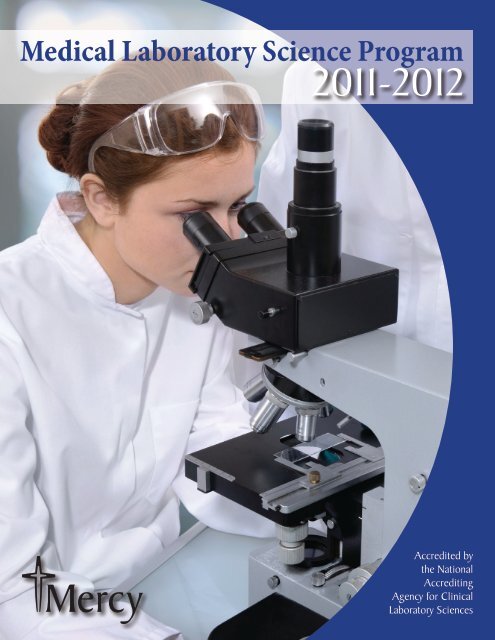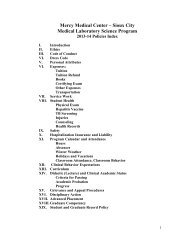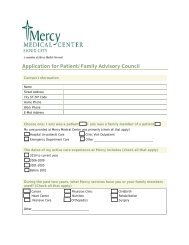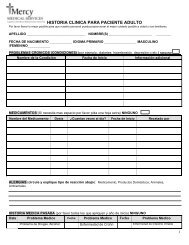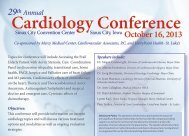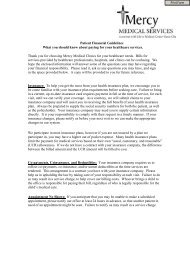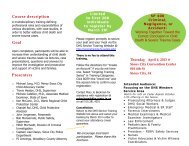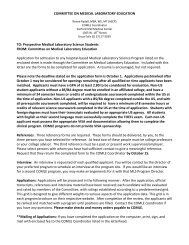Medical Laboratory Science Program - Mercy Medical Center Sioux ...
Medical Laboratory Science Program - Mercy Medical Center Sioux ...
Medical Laboratory Science Program - Mercy Medical Center Sioux ...
Create successful ePaper yourself
Turn your PDF publications into a flip-book with our unique Google optimized e-Paper software.
<strong>Medical</strong> <strong>Laboratory</strong> <strong>Science</strong> <strong>Program</strong><br />
2011-2012<br />
Accredited by<br />
the National<br />
Accrediting<br />
Agency for Clinical<br />
<strong>Laboratory</strong> <strong>Science</strong>s
<strong>Medical</strong> <strong>Laboratory</strong> <strong>Science</strong> <strong>Program</strong> at <strong>Mercy</strong> <strong>Medical</strong> <strong>Center</strong><br />
Mission<br />
The <strong>Mercy</strong> <strong>Medical</strong> <strong>Center</strong> – <strong>Sioux</strong> City <strong>Medical</strong> <strong>Laboratory</strong> <strong>Science</strong> <strong>Program</strong> is committed to providing didactic<br />
and practical instruction, which will allow our students to acquire the knowledge, skills and attitudes necessary to<br />
attain a high level of competency in the practice of medical laboratory science. This program is accredited by the<br />
National Accrediting Agency for Clinical <strong>Laboratory</strong> <strong>Science</strong>.<br />
The majority of students enrolled in the program are college seniors from formally affiliated colleges. This program<br />
will complete the requirements for the <strong>Medical</strong> Technology/Clinical <strong>Laboratory</strong> <strong>Science</strong>/ <strong>Medical</strong> <strong>Laboratory</strong><br />
<strong>Science</strong> baccalaureate degree. Other students are those who have obtained a baccalaureate degree prior to entry.<br />
Graduates of this program are eligible to take a national certifying examinations given by the American Society of<br />
Clinical Pathologists (ASCP) Board of Certification.<br />
<strong>Mercy</strong> <strong>Medical</strong> <strong>Center</strong> – <strong>Sioux</strong> City<br />
Living the traditions, visions and values of the Sisters of <strong>Mercy</strong>, <strong>Mercy</strong> <strong>Medical</strong> <strong>Center</strong>–<strong>Sioux</strong> City has grown<br />
into a 238-bed (staffed) regional center that meets the needs of residents in a 33-county area. <strong>Mercy</strong> is the only<br />
Level-II Trauma <strong>Center</strong> in western Iowa and is one of only four trauma care facilities in the state of Iowa to receive<br />
verification from the American College of Surgeons.<br />
<strong>Mercy</strong> provides an entire continuum of preventive, primary, acute and tertiary healthcare services and is nationally<br />
recognized in several clinical areas. <strong>Mercy</strong> <strong>Medical</strong> Services, a partner to the medical center, operates 30 family<br />
practice and 9 specialty clinics in Iowa and Nebraska. Additionally, <strong>Mercy</strong> owns Baum Harmon <strong>Mercy</strong> Hospital in<br />
Primghar, Iowa and Oakland <strong>Mercy</strong> Hospital in Oakland, Nebraska, and manages Hawarden Community Hospital<br />
in Hawarden, Iowa, and Pender Community Hospital in Pender, Nebraska. <strong>Mercy</strong> <strong>Medical</strong> <strong>Center</strong>–<strong>Sioux</strong> City is a<br />
member of Trinity Health of Novi, Michigan, the fourth largest Catholic healthcare system in the nation.<br />
The <strong>Medical</strong> <strong>Laboratory</strong> <strong>Science</strong> <strong>Program</strong><br />
The <strong>Medical</strong> <strong>Laboratory</strong> <strong>Science</strong> <strong>Program</strong> in the clinical laboratory at <strong>Mercy</strong> <strong>Medical</strong> <strong>Center</strong> was established in<br />
1941 and is accredited by the National Accrediting Agency for Clinical <strong>Laboratory</strong> <strong>Science</strong>s.<br />
The year of professional study begins in August and the average class size is four students. The curriculum consists<br />
of didactic classroom lectures, and clinical instruction by certified medical technologists/medical laboratory<br />
scientists in all areas of the laboratory. The lecture portion of the program is given in conjunction with the St.<br />
Luke’s College/St. Luke’s Regional <strong>Medical</strong> <strong>Center</strong> <strong>Medical</strong> <strong>Laboratory</strong> <strong>Science</strong> <strong>Program</strong>. The two hospitals are<br />
approximately 1.5 miles apart.<br />
Students are assigned to clinical rotations in the <strong>Mercy</strong> <strong>Medical</strong> <strong>Center</strong> hospital laboratory and the Dunes<br />
laboratory locations. The hospital laboratory is located on the fifth floor and serves inpatients, as well as surgical,<br />
trauma and outpatients. The Dunes laboratory site is located in a medical office park located approximately 6 miles<br />
from the hospital on I-29 in Dakota Dunes, SD. Both laboratory sites are equipped with instrumentation that allows<br />
laboratory personnel to perform a wide variety of tests accurately and precisely, and on a timely basis. Areas of<br />
testing include chemistry, hematology, coagulation, urinalysis, immunology, immunohematology (blood banking),<br />
and microbiology.<br />
<strong>Program</strong> Goals<br />
• To provide an educational program in accordance with standards established by the National Accrediting<br />
Agency for Clinical <strong>Laboratory</strong> <strong>Science</strong>s (NAACLS).<br />
• To maintain a curriculum and standard of academic education consistent with criteria acceptable for a<br />
college program culminating in a baccalaureate degree.<br />
• To provide the community and region with qualified medical laboratory scientists.<br />
• To adequately prepare and encourage those students who want a general medical laboratory science<br />
background prior to the pursuit of advanced education in the profession, teaching careers in medical<br />
laboratory science, or employment in commercial and other related medical laboratory fields.
Affiliated Colleges & Universities/Advisors<br />
• Briar Cliff University, <strong>Sioux</strong> City, IA, Paul Weber, PhD<br />
• Dordt College, <strong>Sioux</strong> <strong>Center</strong>, IA, Tony Jelsma, PhD<br />
• Mount Marty College, Yankton, SD, Krisma DeWitt, PhD<br />
• Morningside College, <strong>Sioux</strong> City, IA, Larry Martin, PhD<br />
• North Dakota State University, Fargo, ND, Polly Olson, MS<br />
• Northwestern College, Orange City, IA, Tim Lubben, PhD<br />
• University of South Dakota, Vermillion, SD, Kay Rasmussen, MS, MLS(ASCP)<br />
• Wayne State College, Wayne, NE, Doug Christensen, PhD<br />
Admission Requirements<br />
The applicant must possess a baccalaureate degree or have satisfactorily completed a minimum of 90 semester<br />
hours (135 quarter hours) in an affiliated college or university, be eligible for a baccalaureate degree upon successful<br />
completion of the professional year of study at the hospital, and possess the required pre-program course work<br />
Minimum pre-clinical and credit requirements are:<br />
• 16 semester hours of chemistry, to include: general chemistry, organic and/or biochemistry<br />
• 16 semester hours of biological sciences, to include anatomy/physiology, genetics/molecular biology,<br />
microbiology, immunology. It is strongly recommended that immunology be a separate course.<br />
• One course of mathematics to include statistics.<br />
The content of chemistry and biological science courses must be acceptable toward a major in those fields or in<br />
medical technology/clinical laboratory science. Survey courses do not qualify as fulfillment of the prerequisites.<br />
Remedial mathematics courses will not satisfy the mathematics requirement.<br />
Applicants must have a minimum cumulative grade point average (GPA) of 2.80 on a 4.0 scale and a minimum<br />
science GPA of 2.80. Applicants with GPA’s below 2.8 may submit a Committee on <strong>Medical</strong> <strong>Laboratory</strong> Education<br />
(COMLE) application. However, applications will be evaluated and considered only after candidates with GPA’s 2.80<br />
or higher have been processed.<br />
Individuals who met the minimal pre-clinical requirements seven or more years before application should update<br />
their academic preparation in a manner acceptable to the program. Individuals who possess a foreign degree and<br />
meet the program’s requirements must have their transcripts evaluated by a qualified transcript evaluation agency.<br />
Contact the <strong>Program</strong> Director for information.<br />
Students meeting the above criteria and possessing certification in laboratory science (CLA, MLT) may be<br />
considered for advance placement in the clinical laboratory rotation portion of the program by demonstrating<br />
competency. The didactic portion of the program does not lend itself to advance placement.<br />
Meeting minimum requirements for application does not guarantee admission into the <strong>Program</strong>.<br />
Essential Requirements<br />
The Essential Requirements provide criteria so that potential applicants can independently evaluate their own<br />
ability to meet, participate in education activities and successfully fulfill the expected competencies required of<br />
a medical laboratory scientist. These performance criteria are in compliance with the current regulations of the<br />
Rehabilitations Act, the Americans with Disabilities Act, Civil Rights Act and the Standards of NAACLS. The<br />
Committee on <strong>Medical</strong> <strong>Laboratory</strong> Education requires that all applicants read and sign the form as part of the<br />
application process.
Application Procedure<br />
Application for entrance into the program is made through the Committee on <strong>Medical</strong> <strong>Laboratory</strong> Education<br />
(COMLE). Application forms may be obtained from the academic affiliate’s Advisor on campus, or from the<br />
<strong>Program</strong> Director at <strong>Mercy</strong> <strong>Medical</strong> <strong>Center</strong> – <strong>Sioux</strong> City <strong>Medical</strong> <strong>Laboratory</strong> <strong>Science</strong> <strong>Program</strong>, 801 5th St., <strong>Sioux</strong><br />
City, IA. 51101. Telephone: 712-279-2371. Online: http://www.mercysiouxcity.com/medical-laboratory-scienceprogram.<br />
Applications must be postmarked on or before October 1 for the class starting the following August. Interviews<br />
are scheduled during October or November. Students are notified of acceptance or alternate status in December/<br />
January. Admission is conditional based on successful completion of science courses in progress and planned at time<br />
of making application. Late applicants will be considered if openings exist.<br />
An accepted student must satisfactorily pass a criminal background check conducted by <strong>Mercy</strong> in the 30 days prior<br />
to the August starting date.<br />
Processing Applications<br />
<strong>Mercy</strong> <strong>Medical</strong> <strong>Center</strong>, along with other members of the Committee on <strong>Medical</strong> <strong>Laboratory</strong> Education,<br />
participates in a matching system for selection of students. Students are ranked numerically according to points<br />
generated through evaluation of the college GPA, course progress, references, interview and a statement of the<br />
applicant’s expectations and goals. The objective is to match qualified students with a program based on available<br />
program positions and student program preference. The individual program does not accept more students than it<br />
has available clinical positions.<br />
The following grid gives the assigned percent values used for evaluating applicants:<br />
• Applicant; Statement of Career Goals 5%<br />
• GPA, science courses 30%<br />
• GPA, non-science courses 10%<br />
• Academic progress 10%<br />
• References 15%<br />
• Interview(s) 30%<br />
Progress Requirement<br />
During the clinical year, students must maintain a minimum grade of C (70 %) or better in each subject area. The<br />
didactic (lecture) subject area constitutes 50% of the grade while the clinical performance constitutes the other 50%.<br />
Grading in the didactic portion of the program is based upon written examinations. Progress in the clinical<br />
portion (bench performance) of the program is evaluated after each rotation through a department. The student is<br />
provided with a detailed explanation of the grading system during orientation week.<br />
Grading System<br />
A 90-100%<br />
B 80-89%<br />
C 70-79%<br />
When the student has satisfactorily completed all requirements of the program, they will be eligible to take a<br />
national certification exam for <strong>Medical</strong> <strong>Laboratory</strong> Scientists (ASCP). The student will be awarded a certificate and<br />
pin from the program and a baccalaureate degree from the college/university. Issuing of the baccalaureate degree or<br />
program certificate is not contingent upon students passing external certification or licensure examinations.<br />
Rules & Regulations<br />
<strong>Program</strong> Policies are reviewed with students during Orientation. These policies state the criteria regarding<br />
academic requirements, academic probation, grievance and appeal procedure and disciplinary action.<br />
Causes for Probation or Dismissal<br />
On the Basis of Grades: Any student failing to achieve an average of C in didactic (lecture) or clinical areas will<br />
be counseled and will be informed of academic status including verbal warning, written probation notice, and lastly<br />
dismissal from the program. Dismissal for scholastic failure or technical incompetence would be per the decision
of a committee comprised of the <strong>Medical</strong> Director, <strong>Program</strong> Director, and Clinical Instructor from the designated<br />
area(s). Progress records are maintained throughout the year and are available to the student at any time.<br />
On the Basis of Conduct: Students are required to conform to existing medical center and laboratory policies<br />
concerning conduct. Reasons for disciplinary actions up to and including dismissal are as follows:<br />
• Theft, immoral conduct, fighting, willful destruction of property on hospital grounds.<br />
• Being under the influence of alcohol, illegal drugs, or chemicals within the institution.<br />
• Inconsiderate treatment of patients or discussion of confidential information with unauthorized persons.<br />
• Cheating on school examinations or dishonesty in the performance or reporting of test procedures.<br />
• Excessive unexcused absenteeism and/or tardiness.<br />
• Any other act classified as criminal.<br />
Students dismissed for reasons of either grades or conduct will not be allowed reentry into the program.<br />
Appeals Procedure<br />
An appeals procedure is available for use by any student having a grievance based upon seemingly unfair<br />
treatment. According to the procedures, a grievance not settled between the parties immediately involved may be<br />
appealed to the <strong>Program</strong> Director of the school, then to the <strong>Medical</strong> Director and finally to a Committee consisting<br />
of the following: <strong>Program</strong> Director, <strong>Medical</strong> Director, College Advisor, two other laboratory faculty members of the<br />
student’s choice and a representative of Human Resources/Education department.<br />
Expenses<br />
Tuition is $4500.00 (2011-12 year; subject to change). An enrollment fee of $300 must accompany the letter<br />
of acceptance and is applied toward the tuition. This $300 fee is not refundable. The tuition will be paid in two<br />
installments, August and February.<br />
Books: approximately $700.00<br />
Criminal Background check: approx. $70 (due with August tuition payment)<br />
Housing/Meals: students are responsible for their own living quarters and meals.<br />
Transportation: students are responsible for providing their own transportation to and from their personal<br />
residence, the hospitals, Dunes <strong>Laboratory</strong> and any enrichment site.<br />
Withdrawals<br />
If a student chooses to withdraw from the program, he/she must submit a written statement of withdrawal to the<br />
<strong>Program</strong> Director. The <strong>Program</strong> Director will notify the college/university of the student’s withdrawal or dismissal<br />
from the program. The college/university will be sent a transcript of any final grades attained. A final grade for<br />
a course is earned after satisfactory completion (70% or higher) of all requirements for a course, including both<br />
didactic and clinical rotation requirements.<br />
Refunds<br />
All institutional charges (tuition and fees) will be refunded according to the following schedule. A week is defined<br />
as 7:00 a.m. Monday through 3:30 p.m. Friday.<br />
Withdrawal during the<br />
Percent of<br />
Following time period<br />
charges refunded<br />
The first day of class 100%<br />
Week 1 75%<br />
Week 2 50%<br />
Week 3 25%<br />
Week 4 25%<br />
Week 5 or later 0%<br />
For students who terminate following February 1 when the second payment is made, a similar refund policy will<br />
apply.
Health and Liability Insurance<br />
Each student must be able to show proof of a current physical, including chest X-ray or TB skin testing; Hepatitis B and<br />
tetanus vaccinations, age appropriate immunity or immunizations for Measles, Mumps and Rubella and Chickenpox.<br />
It is recommended that the hepatitis vaccine series be initiated before the beginning of the clinical year. Students<br />
who experience a blood and body fluid exposure during the course of the Hospital laboratory training program will<br />
be initially provided post exposure follow up testing through the Hospital Employee Health nurse at no cost to the<br />
student. Further medical costs associated with follow up care that is recommended or required due to the exposure<br />
will be the responsibility of the student and his/her their personal health insurance. The Hospital will not pay for<br />
any costs associated with other injuries or illnesses experienced by the student during the course of the Hospital<br />
laboratory training program, however students can seek medical care and treatment through the Hospital Emergency<br />
Department. Any costs for medical care and treatment other than for initial blood and body fluid exposure testing,<br />
will be the responsibility of the student and/or the student’s personal health insurance policy.<br />
<strong>Mercy</strong> <strong>Medical</strong> <strong>Center</strong> maintains a comprehensive liability insurance program, which covers students during the<br />
12-month period in which they are enrolled in the MMC <strong>Medical</strong> <strong>Laboratory</strong> <strong>Science</strong> <strong>Program</strong>.<br />
Financial Aid<br />
Students seeking financial assistance are encouraged to contact their college/university financial aid office for<br />
information.<br />
Limited scholarships are available through professional organizations. The <strong>Program</strong> Director can provide this<br />
information.<br />
<strong>Program</strong> Calendar<br />
The 12 months of professional study begins in August and consists of learning experiences in all phases of medical<br />
laboratory science. Mornings are spent attaining practical experience in the clinical laboratory under the supervision<br />
of certified medical technologists/medical laboratory scientists. Afternoons are devoted to a formal program of<br />
lectures and student laboratory exercises. This portion of the program is given in conjunction with the St. Luke’s<br />
College <strong>Medical</strong> <strong>Laboratory</strong> <strong>Science</strong> <strong>Program</strong>.<br />
Hours are from 7:00 am until 3:30 pm Monday through Friday, with some days from 6 am until 2:30 pm when no<br />
afternoon class is scheduled. Two days on the afternoon shift (2 pm until 10:30 pm) is included during the year. The<br />
following holidays will be observed: Labor Day, Thanksgiving Day and the Friday following, Christmas Day, New<br />
Years Day, Good Friday, Easter Monday, Memorial Day, and July 4th. There will be a two-day fall break, approximately<br />
two weeks of vacation during the Christmas holiday season, one-week spring break and three personal days.<br />
Students will be allowed three personal days if needed for illness, travel, interviews, etc. Students who are absent<br />
beyond three days will make up clinical time missed, by completing clinical time during scheduled academic calendar<br />
breaks, at the end of the clinical year or on weekends or evenings when a teaching technologist is available. Makeup<br />
hours are subject to approval by the <strong>Program</strong> Director. Students are responsible for all lecture material missed due to<br />
absence.<br />
COURSE DESCRIPTIONS<br />
MAJOR SUBJECTS:<br />
Range of Semester Hour Credits<br />
1. CLINICAL MICROSCOPY/URINALYSIS 2-3 sem. hrs.<br />
Lecture, supervised laboratory instruction, quality control, instrumentation, computer applications<br />
and experience in body fluids and urine in regard to chemical and cellular composition. Anatomy and<br />
physiology, theory of renal function in health and disease.<br />
2. CLINICAL HEMATOLOGY/COAGULATION 5-8 sem. hrs.<br />
Lecture, supervised laboratory instruction, quality control, instrumentation, computer applications and<br />
experience in the analysis of cellular elements of the blood and bone marrow, both normal and abnormal,<br />
and on the hemostatic mechanisms of the blood.
3. CLINICAL MICROBIOLOGY 8-12 sem. hrs.<br />
Lecture, supervised laboratory instruction, quality control, instrumentation, computer applications and<br />
experience in the isolation and identification of pathogenic organisms and their susceptibility to antimicrobial<br />
agents. Includes Bacteriology, Mycology, Parasitology, and Virology.<br />
4. CLINICAL SEROLOGY/IMMUNOLOGY 2-3 sem. hrs.<br />
Lecture on antigen/antibody structure-function-interaction, supervised laboratory instruction, quality<br />
control, instrumentation, computer applications, and experience in applying the principles of immunology to<br />
serologic diagnosis.<br />
5. CLINICAL CHEMISTRY 8-12 sem. hrs.<br />
Lecture, supervised laboratory instruction, quality control, computer applications, instrumentation, and<br />
experience in medically oriented biochemistry as applied to normal and abnormal physiology and analyses<br />
of body constituents. Includes analyses of special body fluids such as amniotic, synovial, cerebrospinal, and<br />
pleural fluids. Includes special procedures utilized for toxicology, endocrinology, and immunoassay.<br />
6. CLINICAL IMMUNOHEMATOLOGY 4-6 sem. hrs.<br />
Lecture, supervised laboratory instruction, quality control, instrumentation, computer applications and<br />
experience in theory and practice of immunohematology as applied to blood transfusion, component<br />
therapy, autoimmune diseases, immunologic diagnostic procedures and blood component preparation and<br />
administration.<br />
SPECIALIZED UNITS (SPECIALIZED TOPICS)<br />
7. ORIENTATION TO MEDICAL LABORATORY SCIENCE 0-1 sem. hrs.<br />
A. Introduction: Introduction to basic techniques, principles of safety, infection control, professional<br />
ethics, personal and professional responsibilities in the clinical laboratory. Review of program’s rules<br />
and regulations. Introduction to clinical significance of laboratory procedures in diagnosis and<br />
treatment.<br />
B. Phlebotomy: Anatomy and physiology of the arm, blood collection techniques from vein,<br />
capillary, artery and difficult draw sites. Specimen variables and handling techniques. Interactive<br />
communication skills with patients and para-professionals.<br />
C. Computer Applications in the <strong>Medical</strong> Lab: An introduction to techniques, principles, and<br />
concept common in laboratory data processing systems. Utilization of computers in the laboratory and<br />
within instruments.<br />
D. <strong>Laboratory</strong> Mathematics/Quality Assurance: <strong>Laboratory</strong> oriented mathematics with emphasis on<br />
performing calculations related to units of measure, pH, Beer’s law and calibration curves, Henderson-<br />
Hasselbach equation, enzyme activity, renal clearance, hematology calculation. Principles and practice<br />
of quality assurance. Includes statistical techniques, method evaluation, and pipette calibration.<br />
8. MANAGEMENT AND SUPERVISION 0-4 sem. hrs.<br />
Lectures and/or seminars on theory and techniques of laboratory oriented management practices utilized in<br />
planning, organizing, directing, controlling and supervising a medical laboratory facility.<br />
9. EDUCATION METHODOLOGIES 0-4 sem. hrs.<br />
Lecture and/or seminars on the principles of education. Includes methods of instruction, writing objectives<br />
and evaluation devices for didactic and clinical practice.<br />
10. INTRODUCTION TO RESEARCH 0-1 sem. hrs.<br />
Faculty guided study, research, scientific writing, case study presentations and/or projects in specialty area(s)<br />
of medical laboratory science.<br />
TOTAL SEMESTER HOURS CREDIT = 40
<strong>Laboratory</strong> and <strong>Program</strong> Administration<br />
Askar A. Qalbani, MD, <strong>Medical</strong> Director<br />
Kris Giese, MHA, MT(ASCP), Director of <strong>Laboratory</strong> Services<br />
Mary K. Smith, MS, MLS(ASCP) CM , <strong>Program</strong> Director<br />
Faculty members include program officials, pathologists, and selected medical technologists /medical laboratory<br />
scientists. A current list of program faculty members and college/university advisors is available from the program<br />
director.<br />
For more information:<br />
Contact the program director at 712-279-2371<br />
Visit our web site at http://www.mercysiouxcity.com/medical-laboratory-science-program<br />
Statement of Policy<br />
<strong>Mercy</strong> <strong>Medical</strong> <strong>Center</strong>’s educational program is an equal opportunity program. Any question of discrimination on<br />
the basis of age, sex, race, color, creed, disability or national origin shall be directed to:<br />
<strong>Mercy</strong> <strong>Medical</strong> <strong>Center</strong>-<strong>Sioux</strong> City<br />
801 5 th Street<br />
<strong>Sioux</strong> City, IA 51101<br />
National Accrediting Agency for<br />
Clinical <strong>Laboratory</strong> <strong>Science</strong>s<br />
5600 N. River Rd.,Suite 720<br />
Rosemont, IL 60018-5119<br />
847-939-3597<br />
www.naacls.org<br />
Revised 8/11


